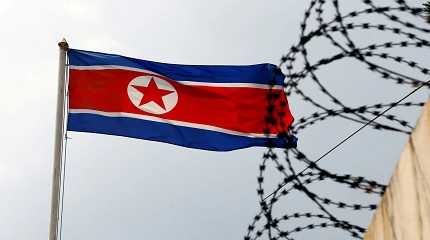
GENEVA, March 21 (Reuters) - A U.N. human rights investigator called on North Korea on Monday to reopen its borders to aid workers and food imports, saying that its further self-isolation during the COVID-19 pandemic may have left many facing "hunger and starvation."
Tomas Ojea Quintana, addressing the U.N. Human Rights Council, said chronic food insecurity was already widespread before the pandemic began two years ago. Only 29% of children aged 6-23 months receive the minimum acceptable diet, he said.
"Now with the country still in the grip of strict COVID-19 measures, there are serious concerns that the most vulnerable segments of the population may be facing hunger and starvation," he said.
The Democratic People's Republic of Korea (DPRK) has not reported any COVID-19 cases and has imposed strict anti-virus measures since the onset of the pandemic, including border closures and domestic travel curbs.
Foreign aid agencies and embassies largely left the country after the restrictions made it hard maintain a presence there.
Ojea Quintana urged North Korea to "gradually open its borders and urgently allow for the return of United Nations agencies, other international organizations and the diplomatic community, and for economic activity and movement of people".
North Korea does not recognise Ojea Quintana's mandate as U.N. special rapporteur for human rights in DPRK or allow him to visit. Its delegation did not take the floor during the debate.
Diplomatic efforts aimed at getting Pyongyang to abandon nuclear weapons should also focus on long-standing rights concerns, Ojea Quintana said. This included the need to release people held in its system of 'kwanliso' or political prison camps which he said constituted crimes against humanity - a charge Pyongyang has rejected.
North Korea appeared to have fired a short-range multiple rocket launcher on Sunday, South Korea's military said, amid heightened military tensions on the peninsula after a spate of larger missile launches by the nuclear-armed North.
Ojea Quintana, noting that North Korea has allocated 15.9% of its national budget for defence, said: "The Government has an obligation to prioritize the right to adequate food when allocating state resources".
North Korea's coercive system of governance deprives people in the country of fundamental freedoms, Ojea Quintana said, citing repression including arbitrary arrest and detention, torture and the practice of forced labour.
During the pandemic, "draconian measures have further strengthened the State's control over the population, such as the policy of shooting individuals who attempt to enter or leave the country", he said.




